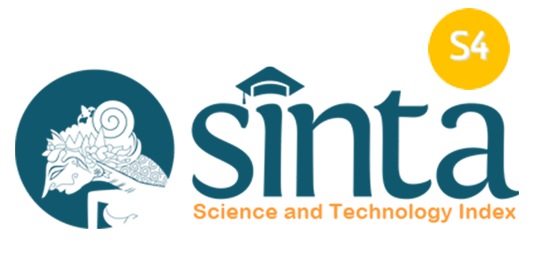New Business Model For Creative Agency Through Influencer Marketing
Abstract
ABSTRACT
Influencer Marketing is seen as one of the best strategies to bring in potential customers when using social media marketing by leveraging the masses of Influencers. The purpose of this study is to analyze the phenomenon of influencer marketing, business models and decision making in the use of influencers in marketing activities for creative agency business people. In this study, we will analyze the social relationships of individuals or groups because influencer marketing can be an appropriate reference group. This study uses secondary data contained in books, white papers, journals, articles which is the basis for a literature review, while primary data uses direct surveys with 200 respondent to social media active users. From the results of this study, it can be concluded that influencers have a significant role in the business processes of creative agencies. Where influencers who have quite significant followers and the variety of content they create make it attractive to consumers.
Keywords : Influencer Marketing, Electronic Word of Mouth, Social Media Marketing.
ABSTRAK
Pemasaran Influencer dipandang sebagai salah satu strategi terbaik untuk mendatangkan pelanggan potensial saat menggunakan pemasaran media sosial dengan memanfaatkan massa Influencer. Tujuan dari penelitian ini adalah untuk menganalisis fenomena influencer marketing, model bisnis dan pengambilan keputusan dalam penggunaan influencer dalam kegiatan pemasaran bagi para pelaku bisnis creative agency. Dalam penelitian ini, kami akan menganalisis hubungan sosial individu atau kelompok karena influencer marketing dapat menjadi kelompok referensi yang tepat. Penelitian ini menggunakan data sekunder yang terdapat dalam buku, white paper, jurnal, artikel yang menjadi dasar dari literature review, sedangkan data primer menggunakan survey langsung dengan 200 responden pengguna aktif media sosial. Dari hasil penelitian ini dapat disimpulkan bahwa influencer memiliki peran yang signifikan dalam proses bisnis agensi kreatif. Dimana influencer yang memiliki followers cukup signifikan dan variasi konten yang mereka buat membuatnya menarik bagi konsumen.
Kata kunci : Influencer Marketing, Electronic Word of Mouth, Social Media Marketing.
Full Text:
PDFReferences
Badan Ekonomi Kreatif (Bekraf). 2019. Laporan Kinerja Badan Ekonomi Kreatif Tahun 2019. https://www.kemenparekraf.go.id/asset_admin/assets/uploads/media/pdf/media_1598879701_BUKU_BEKRAF_28-8-2020.pdf.
Casalo, L. V., Flavi ́an, C., & Ib ́a ̃nez-S ́anchez, S. (2020). Influencers on Instagram: Antecedents and consequences of opinion leadership. Journal of Business Research, 117, 510–519. https://doi.org/10.1016/j.jbusres.2018.07.005
Charlesworth, A. (2014). Digital marketing: A practical approach. Routledge.
Contestabile, G. 2018. Influencer Marketing in 2018: Becoming an Efficient Marketplace. AdWeek.
Creswell, J. W. (2014). Research design: qualitative, quantitative, and mixed methods approaches. 4th ed. Thousand Oaks, California: SAGE Publications.
Defrianto, D., & Loisa, R. (2019). Efektivitas Social Media Marketing E-Commerce dalam Meningkatkan Brand Image Perusahaan (Survei Pada Pelanggan Tokopedia). Prologia, 3(2), 505. https://doi.org/10.24912/pr.v3i2.6398.
Dhanesh, G. S., & Duthler, G. (2019). Relationship management through social media influencers: Effects of followers’ awareness of paid endorsement. Public Relations Review, 45(3), 101765. https://doi.org/10.1016/j.pubrev.2019.03.002
Hennig-Thurau, T., Gwinner, K. P., Walsh, G., & Gremler, D. D. (2004). Electronic word-of-mouth via consumer-opinion platforms: What motivates consumers to articulate themselves on the Internet? Journal of Interactive Marketing, 18(1), 38–52. https://doi.org/10.1002/dir.10073.
Hu, L., Min, Q., Han, S., & Liu, Z. (2020). Understanding followers’ stickiness to digital influencers: The effect of psychological responses. International Journal of Information Management, 54, 102169. https://doi.org//10.1016/j.ijinfomgt.2020.102169
Jalilvand, M. R., Esfahani, S. S., & Samiei, N. (2011). Electronic word-of-mouth: Challenges and opportunities. Procedia Computer Science, 3, 42–46. https://doi.org/10.1016/j.procs.2010.12.008.
Khamis, S., Ang, L., & Welling, R. (2016). Self-branding, “micro-celebrity” and the rise of Social Media Influencers. Celebrity Studies, 8(2), 191–208. https://doi.org/10.1080/19392397.2016.1218292.
Keegan, Brendan & Rowley, Jennifer & Tonge, Jane. (2017). Marketing Agency-Client Relationships: Towards A Research Agenda. European Journal of Marketing. 51. https://doi.org/10.1108/EJM-10-2015-0712.
Kim, D. Y., & Kim, H.-Y. (2021). Influencer advertising on social media: The multiple inference model on influencer-product congruence and sponsorship disclosure. Journal of Business Research, 130, 405–415. https://doi.org/10.1016/j.jbusres.2020.02.020
Kim, A. J., & Ko, E. (2012). Do social media marketing activities enhance customer equity? An empirical study of luxury fashion brand. Journal of Business Research, 65(10), 1480–1486. https://doi.org/10.1016/j.jbusres.2011.10.014.
Lampel, J., Lant, T., & Shamsie, J. (2000). Balancing Act: Learning from Organizing Practices in Cultural Industries. Organization Science, 11(3), 263–269. https://doi.org/ 10.1287/orsc.11.3.263.12503.
Lee, J. E., & Watkins, B. (2016). YouTube vloggers’ influence on consumer luxury brand perceptions and intentions. Journal of Business Research, 69(12), 5753–5760. https://doi.org/10.1016/j.jbusres.2016.04.171
Lynch, J., & West, D. C. (2017). Agency Creativity: Teams and Performance. Journal of Advertising Research, 57(1), 67–81. https://doi.org/10.2501/jar-2017-006
Muntinga, D. G., Moorman, M., & Smit, E. G. (2011).Introducing COBRAs: Exploring motiva-tions for brand-related social media use.International Journal of Advertising,30(1), 13–46.5840B. Godey et al. / Journal of Business Research 69 (2016) 5833–5841.
Nordqvist, C. (2018). 3 Ways Influencer Marketing Contributes to Business Success. Retrieved from https://marketbusinessnews.com/influencer-marketing/190224/.
Peck, H., Christopher, M., Clark, M., & Payne, A. (2013). Relationship Marketing. https://doi.org/10.4324/9780080525150
Permana, R. M. T., & Pratama, R. A. R. J. (2020). Making Effectiveness Customer Complaint Handling. Almana : Jurnal Manajemen Dan Bisnis, 4(2), 237–243. https://doi.org/10.36555/almana.v4i2.1398.
Rahartri. 2019. “Whatsapp” Media Komunikasi Efektif Masa Kini (Studi Kasus Pada Layanan Jasa Informasi Ilmiah Di Kawasan Puspiptek). Perpustakaan Nasional. Visi Pustaka Vol. 21, No. 2, Agustus 2019.
Rohandi, MMA. 2016. Effective Marketing Communicaton : Word Of Mouth. Jurnal Manajemen dan Bisnis: Performa Vol.13, No. 1 Tahun 2016.
Smith, R. E., & Yang, X. (2004). Toward a General Theory of Creativity in Advertising: Examining the Role of Divergence. Marketing Theory, 4(1-2), 31–58. https://doi.org/10.1177/1470593104044086
Todisco M. (2017). Why Influencer marketing is essential for any business looking to grow. Forbes. December.
Vodák, J., Novysedlák, M., Čakanová, L., & Pekár, M. (2019). Influencer Marketing as a Modern Phenomenon in Reputation Management. Managing Global Transitions, 17(3). https://doi.org/10.26493/1854-6935.17.211-220.
DOI: https://doi.org/10.29313/performa.v18i3.8101
Refbacks
- There are currently no refbacks.
Copyright (c) 2021 Jurnal Manajemen dan Bisnis (Performa)
Jurnal manajemen dan bisnis (Performa) diindeks oleh:
Alamat Redaksi:
Jl. Tamansari 1, Bandung 40116, Jawa Barat, (022) 4203368 pes. 210, (022) 4264064. jmb.performa@gmail.com / jmb.performa@unisba.ac.id

This work is licensed under a Creative Commons Attribution-NonCommercial-ShareAlike 4.0 International License. ISSN 1829-8680 | E-ISSN 2599-0039

_(2).jpg)








